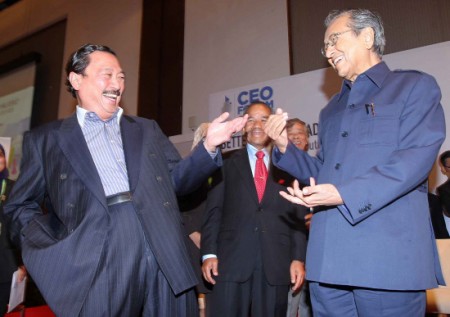Despite Mahathir’s loud invectives against the United States (US), Malaysia had good relations with the US at various levels during his tenure as prime minister, extending from police and military cooperation, to trade and investment ties, and including cultural cooperation.
Prime Minister Najib Razak is more transparent about his dealings with the US and his position vis-├а-vis the US. He has not raised rabid calls against the US, while also appealing for their assistance in the areas of trade, investment and technology.
The Trans Pacific Partnership (TPP) agreement is an interesting issue because it forces Najib to publicly declare his stand on a number of questions. Najib can choose to opt for silence. But that will be an answer in itself, because not saying “No” will indicate consent.
The most difficult knot that Najib will have to undo is the tension between the national agenda and the demands of global liberalisation. The TPP draws the members of the potential agreement towards a scenario where economic liberalism prevails. Economic liberalism does not comfortably share the same bed as that carved by the Malaysian agenda.
The Malaysian economic agenda is characterised by preferential treatment for Bumiputera, certain classes of entrepreneurs, particular types of small and medium enterprises, and support for specific aspirations. This stands in conflict with the liberal economic culture where all individuals are held as equals, with efficiency, competitiveness and productivity as the measure of economic achievement, and the optimisation of social welfare as the mark of success. Social welfare in these terms is taken to be the welfare of the economy in its entirety and not that of particular groups of people.
The underlying philosophy of the TPP has more in common with neo-classical economics and economic liberalism than it has with that of the Malaysian economic agenda.
Although a country achieves an overall increase in social welfare, this can be attained in spite of the losses that certain sections of the economy have incurred. Going by economics pure and simple this would be a preferred choice. But what if the sections that have lost are large or powerful? What if the groups that have suffered losses are icons of the nation, entities that are symbolic of certain aspirations?
Let us say Walmart enters the country. A thousand Walmarts open their outlets throughout the country. Twenty million Malaysians gain from the decrease in prices, better services and enjoy a wider range of goods. But, what if all the Mydins have to close down in the process?
The question ceases to be an economic one and becomes a political issue.
Two other significant issues that force Najib to take a firm stand relate to the economic value of rights and freedom, and transparency.
The transparency requirement can be stringent and far-reaching. The transparency condition will require the government to invite open tenders for projects, especially if they are mega projects that are to the interest of multinational corporations; it will expect government agencies to announce on their websites what incentives are on offer; it may even require government agencies to explain why certain applications that have been filed by MNCs have been rejected. And if incentives and conditions that have been offered by the government have not been fulfilled, or are thought not to have been fulfilled, then the MNCs can take legal redress against the government.
Economic liberalism treats all individuals and companies as being equal. Equality is the cornerstone of rights and freedom. One individual, regardless of his/her faith, gender, conviction, is as good as the other. The importance of this point came across with resounding clarity when Obama, during his visit to Malaysia, said that prejudices against people from different religions and races have no place in the modern world and must be removed. He was quoted as saying that “Malaysia won’t succeed if the non-Muslims do not have the same opportunity.” All individuals in exercising their rights should have the freedom to be and do as they please so that they can flourish.
A liberal framework will also demand that companies, too, are placed on equal footing regardless of their country of origin. An American company will have to be treated no differently than a Malaysian company. Companies, wherever they come from, so long as they are members of the TPP agreement should not be discriminated, should be given equal opportunity, and should be allowed to flourish.
These are complicated issues. But they are the set of rules that will govern global trade in the future. These rules step on the toes of many who have vested interests. The choice is definitely not easy: do we reject these rules and whatever thinking underpins it? Or do we bite the bullet and march forward?
To add to the complexity of these problems there is the question of intellectual property rights and the associated fear of rising health care costs. This is a huge problem, with or without the TPP. Malaysia has provided excellent health care at subsidised costs in its public hospitals thus far, but all indications are that it may take a market-oriented approach. This is a separate question.
There are a several options that are available. One policy attitude will be for Prime Minister Najib and Mr Mustapa Mohamed, the Minister of International Trade and Industry, to engage the Malaysian public on the government’s vision for the future. This will mean taking the bull by its horns and selling their vision of the future. The other option is to sign the agreement without prior buy-in from all parties, and to undertake reform subsequent to signing the TPP agreement. The third option is to realise the gravity of the opposition and to succumb to its pressure.
 Facebook
Facebook  Twitter
Twitter  Soundcloud
Soundcloud  Youtube
Youtube  Rss
Rss 